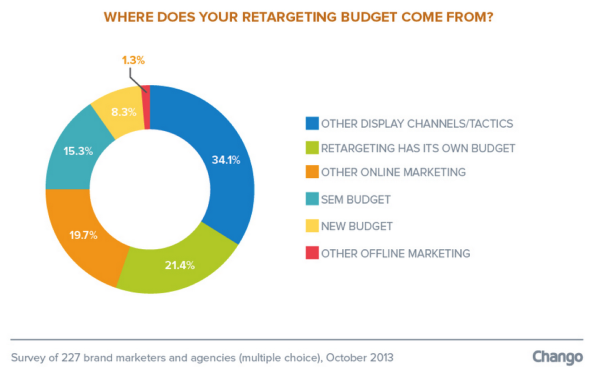New Research: The Retargeting Barometer, 3rd Edition
The results have just been released from the 3rd edition of the Retargeting Barometer, the ad industry’s only survey focused on the use of retargeting. Published by Chango, and this time in partnership with Digiday, the study attracted 300 respondents, including brand marketers from a broad set of industries and from media agencies. The full […]
The results have just been released from the 3rd edition of the Retargeting Barometer, the ad industry’s only survey focused on the use of retargeting.
Published by Chango, and this time in partnership with Digiday, the study attracted 300 respondents, including brand marketers from a broad set of industries and from media agencies. The full report can be downloaded here.
Key Highlights
The key highlights from the 3rd edition of the Retargeting Barometer are:
- Retargeting is becoming more and more standard for sure, yet there are surprising gaps in its use and how it is measured.
- Retargeting is owned by many different types of people in an organization.
- Agencies are further ahead with video and mobile usage than the marketers at brands.
- Agencies and brands do not agree on how retargeting campaigns should be measured and the purpose of some tactics.
The respondents to the survey can be described as follows:
- 51% of respondents identified their role as marketing, and 26% as media.
- Half were manager level or above.
- Almost 10% were executive level.
- Diverse set of industries, weighted to media, and a small bias to the auto industry.
- There are still many young and less-experienced individuals fueling the growth of this industry, with 55% being in the industry less than 2 years, and the same number being with their current employer for the same time.
Paying For Retargeting
We started by asking how marketers pay for their retargeting programs today. A third of respondents buy their retargeting from a budget that has been designated as “display media,” and in addition, 21% have a dedicated budget specifically for retargeting only.
What might surprise some is that 15% are paying for their retargeting from their SEM budget — but what you must remember is that there are actually seven types of retargeting, one being Search Retargeting, which we do see occasionally coming from a search marketer’s pocket.
The data show that progress has certainly been made — two years ago, when we ran the 1st edition, almost half of marketers had to form a new budget in order to run retargeting. In the 2nd edition in April of this year, it was already down to 17%. Today, with this 3rd edition, it is at 8%.
Types Of Retargeting Tactics
Naturally, display media is the most common form of retargeting, with the rest playing catch up. The interesting data are exposed when we break down the responses from the marketers working directly at the brands versus those from the media agencies.
The agencies are pulling ahead in mobile and video, and it seems that agencies are less fearful of trying what’s new and pushing their clients into innovative areas. Also, I suspect that a brand’s marketing team simply doesn’t have the resources to try everything new, and are therefore unlikely to be the trailblazers.
We went on to ask about goals for these channels, and whilst 33% of agencies responded that they did have a different goal for retargeting in mobile, only 19% of brands shared the view. The agencies need to pay attention to this, and be sure they are having proper discussions with their clients, and setting the right expectations.
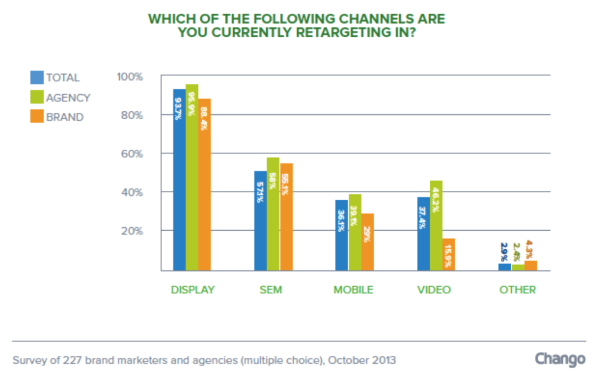
View-Through Measurement Grows
View-through, or “post-impression,” measurement has to be one of the most misunderstood aspects of digital marketing. Put simply, a view-through (VT) conversion occurs when an individual sees an ad, does not click on it, but still goes on to convert.
There are many studies that show that the click is an invalid metric to use, and so it is very important the industry understands what view-through really is. Thankfully, the majority of marketers are now looking at a combination of click- and view-based conversions; and, more encouragingly, for the first time VT-only conversions appears on our survey as a measurement type, and is already at 5%.
Anecdotally, I can tell from many discussions with CMOs that the industry is getting smarter about VT and realizing that the click is an invalid tool.
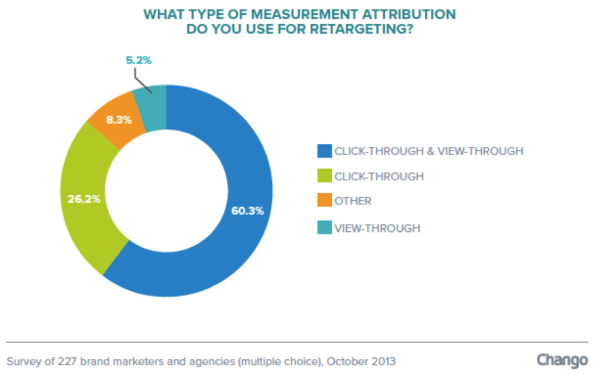
Search Retargeting Is Here To Stay
Lots of confusion remains about what retargeting is. Many assume it is site retargeting only, but in reality there are many events other than the site visit than can be retargeted.
Search retargeting finds those individuals who have searched on Google, Yahoo or Bing but who have not yet visited your site. This means retargeting can be a tool for speaking with your existing customers and visitors, as well as for finding brand new prospects to engage with. The numbers in this 3rd edition show that search retargeting is growing in use, and has now become a mainstream tactic used by agencies and marketers alike.
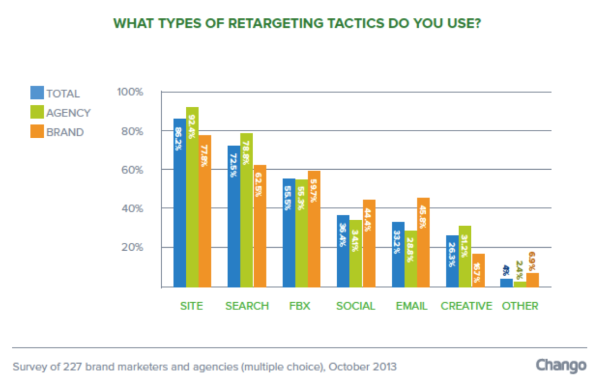
Agencies & Brands Disagree About The Purpose Of Retargeting
According to the data, direct response reigns as the #1 reason for running a retargeting program, but where agencies should pay attention is that 27% of their colleagues feel site retargeting is used for new customer acquisition, but almost 50% of the brands surveyed see it this way.
This is likely because looking at net new customers and lifetime value is really what brands want, but rarely are they making that data available to their agency partners. Agencies seem to be compensating by offering up on-site engagement as a measurement, yet the brands don’t seem to care about that as much.
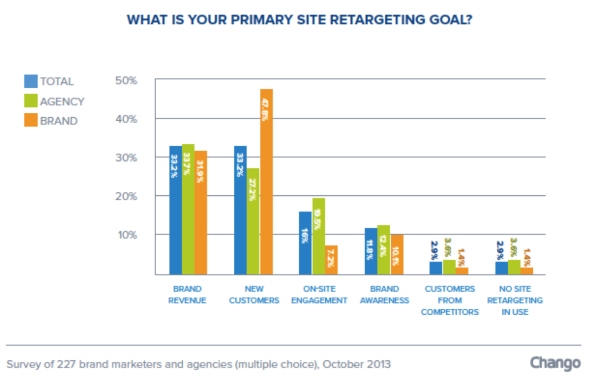
Some Things Remain Challenging
Despite the success of retargeting, problems such as integration remain. And for the first time, a lack of transparency is rearing its head a lot, and the industry must address that in more detail to satisfy the marketers.
This is potentially fueled by marketers getting smarter and smarter, and also because alternatives to high-margin vendors exist. Somewhat amazingly for 2013, creative production is still a blockage that refuses to go away, as is simply a lack of time to get a program live.
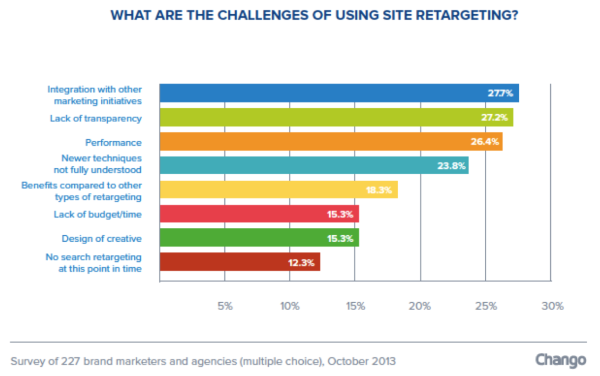
Vendors Must Find A Voice
And when it comes to the ad tech landscape, the agencies and brands departed from each other again with 55% of agencies citing too many vendors selling the same thing, versus only 30% of marketers.
This is most likely caused by ad tech vendors increasing their bagel budget to go talk to agencies, and marketers simply not dedicating the same time to listen to vendors’ pitches because of resources. For a vendor to succeed they must have a clear message that is simple to digest, and that allows marketers and agencies to find a reason to run with them.
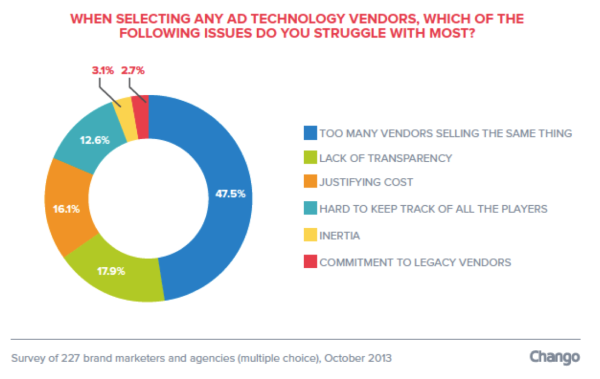
Keeping Them Awake At Night
And finally, what will keep our respondents awake at night? We asked them to rate each broad problem on a scale of 1 to 5, where 1 was not at all important, and 5 was extremely important
Perhaps no surprise was the need to measure performance (which ties in with the rightful growth of VT as a measurement) followed by ensuring the campaigns actually perform. Privacy sits about halfway down in the results, even though in a separate question we asked them about whether they thought the US government would step in with more privacy legislation, and more than 50% thought it would.
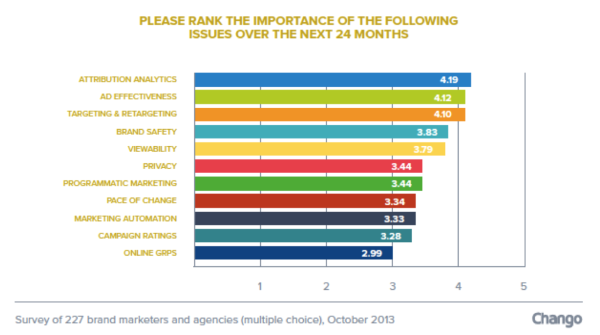
You can download the 3rd edition of the Retargeting Barometer now.
Contributing authors are invited to create content for MarTech and are chosen for their expertise and contribution to the martech community. Our contributors work under the oversight of the editorial staff and contributions are checked for quality and relevance to our readers. MarTech is owned by Semrush. Contributor was not asked to make any direct or indirect mentions of Semrush. The opinions they express are their own.
Related stories
